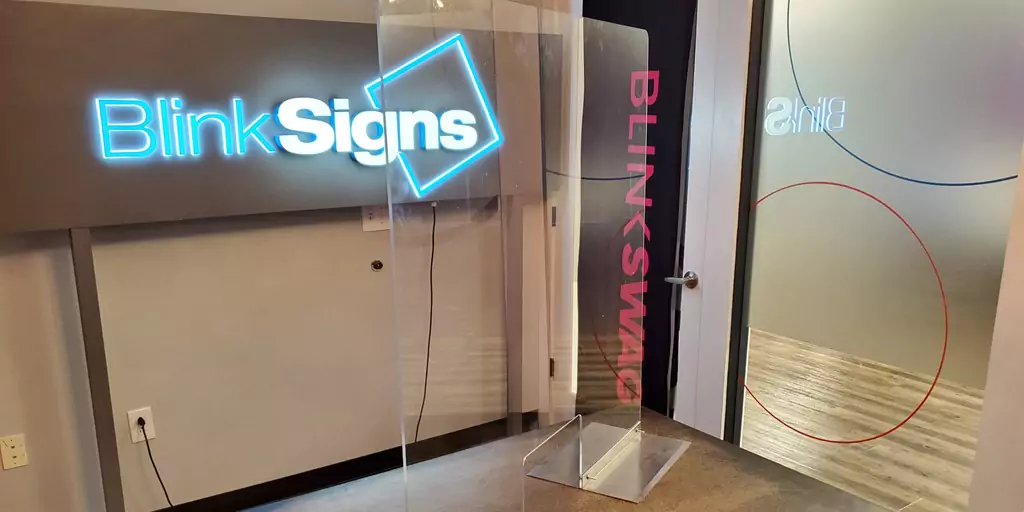
COVID-19 Protection with Sneeze Guards | If your business has checkout counters, you NEED this product!
On March 11, 2020, the World Health Organization (WHO) declared that the outbreak of the viral disease COVID-19 reached the level of a global pandemic. Since then, employers around the world have reacted responsibly and have made big adjustments to ensure the safety of their workforce. While the corporate sector has issued a “work from home” policy for its employees, many other sectors particularly the retail industry simply don’t have that luxury and are facing unprecedented pressure to keep up with the changing landscape.
Now Introducing “Sneeze Guards” Place sneeze guards on your checkout counters to ensure protection against COVID-19. Please call to place an order 877-433-4466
Consequently, the government has also requested that retailers and supermarkets keep their stores open. The availability of life-essentials such as groceries and medicine will help to prevail the sense of calm in the public. This leaves retailers in the middle of a bulls-eye as they have the responsibility to minimize the psychological effects caused by the virus by providing supplies to the public while at the same time, taking all the preemptive measures to ensure the optimal health of their customers and workers, who are certainly more exposed to the virus.
FDA, CDC, OSHA and other concerned agencies have issued a list of best practices to operate retail food stores during the COVID-19 pandemic to safeguard workers and consumers. Here is a brief summary:
Work Practice and Engineering Controls
- Screen employees for fever as they arrive at work. Make sure that you have enough temperature scanning devices placed at the entrance and screen every person going into the store.
- Place hand-sanitizers on the entrance and request every customer to sanitize before they enter the store.
- Conduct staff training and instruct them to maintain physical distance with other employees and the general public. You can also achieve this by marking the floor every 6 feet in order to minimize the chances of any physical contact.
- Plastic sneeze guards are a wonderful solution to ensure protection against respiratory droplets caused by people talking, coughing and sneezing.
Administrative Controls
- Be empathetic to your employees to understand their concerns. If any of your staff members is feeling unwell or showing any kind of symptoms, let them take a day off without any deductions.
- Place banners or digital signs in the store to communicate important information and precautionary measures to your customers and employees.
- Since the virus can live on surfaces, it’s a wise practice to regularly administer disinfectant sprays on frequently touched surfaces. However, it’s important to note that disinfectants only work on surfaces and not on the human body. Do not administer disinfectant sprays on your employees or customers. Products listing sodium hypochlorite as the main ingredient can harm certain membranes in the body, instead of killing the virus.
- You may also consider limiting the number of customers entering your store. If you think the store is getting crowded and physical distancing is getting difficult, request new customers to please wait until some customers leave.
Personal Protective Equipment (PPE)
Personal Protective Equipment is a protective gear that is effective in minimizing exposure to the virus. PPE is mandatory for health workers as they are on the front lines, however, cashiers and clerks in the supermarket are also extremely vulnerable to the virus. Store owners should consider providing PPE equipment such as face shields, goggles and disposable gloves to their employees.
In these difficult times, store employees are looking at their bosses to keep up safety. As a store owner, it’s your responsibility to ensure that your heroes are in good health. It is also important to boost the confidence of your employees as they are doing great service in these stressful times.
Protective Gear and Plexiglass Acrylic Sneeze Guards by BlinkSigns
During these unprecedented times, BlinkSigns have decided to play their role by supplying Protective Gear, barrier shields and Plexiglass Acrylic Sneeze Guards at the most reasonable prices. We are manufacturing quality protective gear that meets all the standards set by health agencies. Contact us or call Call now: 877-433-4466